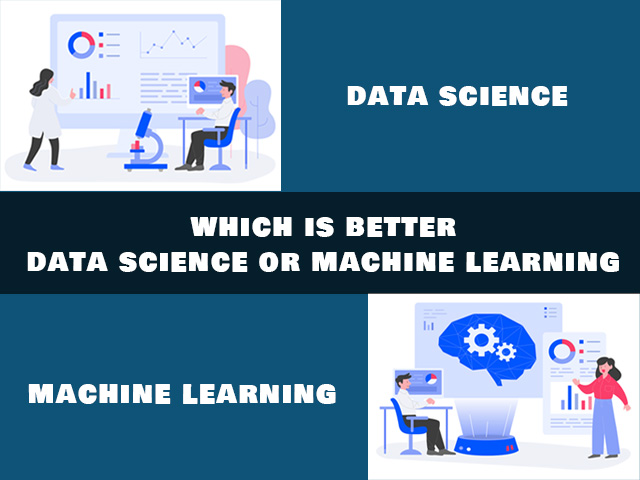Machine learning and Data Science, both the fields are booming these days, with a wide range of applications in various areas, like Entertainment, Security, Finance, Transport, E–Commerce, and many other sectors. You might have heard the terms Machine learning, and Data Science a thousand times now, even if you nowhere belong to Data Science or Machine learning background.
So, when these industries are booming so much, maybe you might also want to get into Machine learning, or Data Science, and make it your career. But you might have heard some people advising you to get into Machine learning, and some advice getting into Data Science, and many often use these terms interchangeably as well, but there is a lot of difference between them, which needs to be understood.
Which is better Data Science or Machine Learning?

So, in this article, we are going to understand what is Data Science, and what is Machine learning, and we will talk about which field can be better for you, is it Data Science, or Machine learning.
What is Data Science?
You might have heard about Data Science a lot these days, and it is becoming increasingly popular, and it can be considered an in-demand career. But what is Data Science? Before we get to the definition of Data Science, let’s understand it with help of an example.
Let’s say that you work for an Entertainment company, which has a video streaming platform. The company wants to increase engagement on the platform, decrease the customer churn rate, or increase the time each customer spends on the platform.
So, the first task that you do is just gather the relevant data related to your works, like related to customers(age, gender, location, preferences, etc.), or related to the content watched, like the thumbnails, video length, titles, keywords, etc.
Next, when you have the data, you need to analyze the data for useful insights, finding patterns in the data, like what age group would be interested in what content, which keywords are being searched more, what genres are being viewed more, are the videos covering the contents properly, or what does make the customer leave the platform, or unsubscribe, or are the customers getting what are they searching for, and how often?
Also, you can perform some data visualization using different visualization tools, which can unfold some information, which may not have been clear just by looking at the raw data.
After doing all this stuff, playing around with a lot of information in search for useful insights, you can then come to the conclusion, suggesting things like adding keywords to the videos, making them shorter for more engagement, giving some discounts to the customers, so they don’t leave the platform, improving the content, finding the bounce rate and minimizing it, and recommending the users with relevant content, on the basis of how other people with similar interests and age watch the content, and on the basis of their own watching habits.
So, doing all this stuff comes under the umbrella of Data Science. You might have got an idea about what happens in the world of data science in brief, but still, let’s consider a kind of definition of Data Science.
“Data Science can be considered as studying the data, to analyze meaningful insights, meaningful information from the data, for the business.” Well, this is what we tried to perform in the above mini-case study example.
Data Science is a multidisciplinary field, which can involve Mathematics, Statistics, Machine Learning, Artificial Intelligence, domain knowledge, and many other tools, which can contribute to analyzing large amounts of data. This analysis helps the Data Scientists to ask the right questions, and get useful information from the data.
This analysis can include questions like what has happened, why it happened, what can happen, and what can we do now.
This is like learning from the data and making some data-driven decisions, for the company, and for the business.
So, we hope that you understood what is Data Science in short, and this takes us to discuss what is Machine Learning.
What is Machine learning?
We have been using Machine learning in our daily life in many cases, either knowingly, or unknowingly, from our google search to our virtual assistants, self-driving cars, or automatically generated messages on social media, which you can send on the go, all these things include Machine learning. But still, the question persists, What is Machine learning?
Let’s consider this thing as well, with an example, so later it becomes easy to understand for us. The term Machine learning has to say that a Machine is learning, but we will try to break that down to understand it in greater detail.
Consider that there is a small kid, which right now cannot differentiate between a dog, and not a dog when shown a Photograph.
So, you show it a lot of photos of dogs, telling each time that this is a dog, and some photos which are not of a dog, telling that this is not a dog. So, after showing some photos, if you show some unseen photograph to the kid, and ask whether this is a dog or not, it would be able to recognize it correctly.
So here, we can say that we are training the kid, to identify the image as a dog, or not a dog, whenever the image is shown. So, when we show some images of a dog to the kid and say this is a dog, it learns some patterns which help it identify a dog and not a dog.
So, what we did is that we provided some data to the kid, and the kid learned some patterns so that later on, it can predict the new unseen image.
Similarly to this, Machine learning enables machines to learn from the data, and make predictions, or take decisions, without being explicitly programmed. This is like we are feeding a lot of data to the machine, and it learns from that and later can be used for predictions, and taking decisions.
Data can be considered like food for the machine in this case. Just like we humans eat food and get the essential nutrients so that we can function properly, machines get the data, and get useful insights from it so that they can function properly.
So, we hope that you got a broad picture of what is Machine learning, and you can explore more about it if you find it interesting, since there is literally an ocean, and what you just drank can be considered as a drop.
Which is better, Data Science, or Machine learning?
After reading about what is Data Science, and what is Machine learning, you might have got a broad idea about which one should be better. The answer to this question depends on certain parameters. The thing is that Data Science is kind of an Umbrella term, which can contain the use of Machine learning in the process.
On the other hand, Machine learning comes out to be a somewhat specific term, enabling machines to learn from the data, make predictions, or take decisions without being explicitly programmed to do so.
So, should you go for a Data Science career or a Machine learning career? If you are in this confusion now, let’s try to clear up some confusion.
First of all, both Machine learning and Data Science are excellent fields and have their own benefits and a wide range of applications in various industries.
You need to understand that Data Science is a broader field, which involves a lot of things, used to get useful insights from the data.
If you learn Machine learning, you can easily move towards learning other things, which are involved in Data Science. If you choose to learn Data Science, you are going to actually learn a set of different technologies, different tools, and other things, which would help you get useful insights from the data in the end, and machine learning is one of the technologies used in data science.
The thing is that whether you go for Data Science or Machine learning. Understanding data is very important in both cases. You can also focus on stuff like data gathering, processing, analyzing, and visualizing, etc., and get going learning other technologies which relate to Data Science and Machine learning. But remember that understanding data is important.
Conclusion
Machine learning and Data Science both are emerging fields with various applications in different areas. In this article, we tried to understand what is Data Science in brief and is Machine learning in brief, and then we had a brief talk about which field is better. Though there would be no concrete answer right now as to which field is better, since the term “better” can have many dimensions, like work-life balance, workload, expertise, packages and perks, and a lot of other things.
But in general, we can consider that Data Science is more of an Umbrella term, and Machine learning is somewhat specific. So, you can explore more about them, and consider the best choice by looking over certain parameters.
FAQs related to Which is better, Data Science or Machine learning?
Q: What is Machine learning?
Ans: We can say that Machine learning enables machines to learn from the data, make predictions, and take decisions without being explicitly programmed.
Q: What is Data Science?
Ans: Data Science can be simply considered as studying the data, applying the domain knowledge, and using various tools and technologies, to get meaningful insights from the data, for the business.
Q: Should I learn Machine learning or Data Science first?
Ans: Data Science is more of an umbrella term, which means that you would be learning a set of different technologies, tools, and techniques, with the end goal to get useful insights from the data. In the journey of learning Data Science, you would go through learning some Machine learning concepts. But if you want to explore Machine learning in greater depth, you can also explore Machine learning.
Q: Is there scope in Machine learning or Data Science?
Ans: Yes, Machine learning Engineers and Data Scientists are in great demand, so we can say that there is scope in Machine learning and Data Science. We produce a great amount of data on a daily basis, and with the data, we experience new challenges, and for that, there is a need for Data Scientists, Machine learning Engineers as well.


